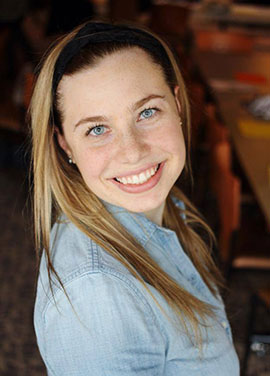Colgate students have fanned out across the globe to apply their liberal arts know-how in a variety of real-world settings. They are writing back to campus to keep our community posted on their progress. This article was written by Brynne Becker ’17, an English and history double-major from West Chester, Pa., conducting research in preparation for Colgate’s bicentennial celebration in 2019.
I first became interested in the history of Colgate while writing about the topic for a paper in my history workshop class in 2014. In the process, I discovered how little I knew about the past of the place that I have called home for the last three years.
Now, I’m working with a team of researchers, including Emily Wong ’18, Professor Jennifer Hull, Professor Jill Harsin, and James Allen Smith ’70, to help tell the history of Colgate in a way that includes people, trends, and events that may not have appeared in traditional stories of the university.
This position provides an excellent opportunity to learn more about Colgate’s past, while simultaneously improving my research skills. I am focusing particularly on the history of coeducation and Title IX at Colgate. It is fascinating to learn about the history of women who have made a difference at this school — to my surprise, it begins far earlier than the official advent of coeducation at Colgate in 1970.
There are too many to single out any one of them as “most important.” Through my research, I have met individuals like Mabel Dart Colegrove, Colgate’s first official coed, who attended Colgate during the 1880s; veterans’ wives, who took classes after World War II; and the women in the graduating class of 1974, who were the first women to start as freshmen at Colgate and graduate from the school.
I have encountered members of the Women’s Coalition, Women at Colgate, and the Women’s Caucus of the 70s and 80s; members of the women’s hockey team in the 90s, who sued the university for violating Title IX. I have learned about the female faculty members and administrators who worked to turn this school from an all-male university to a coed institution — then, from a place where female students felt marginalized, to a school where I have never questioned my place or rights as a student.
Aside from conducting interviews and working on a few other projects, I do most of my research in the Special Collections and University Archives section of the Case Library and Geyer Center for Information Technology. My work involves identifying, summarizing, and organizing documents of interest that are found either in the archives or through Colgate’s digital collection.
This is a process that requires a lot of patience and perseverance. There are times when it is very difficult to find information on particular topics, and sometimes the information in these documents differs from what I thought I might find. However, this is also what makes this work so interesting and rewarding.
Working in the archives is like trying to put together a puzzle without having seen the illustration on the front of the box. In the end, I hope that the rest of the team and I can piece together these documents into a narrative that sheds light on an important part of Colgate’s past.
Related:
Summer internship blog series: (NBC)Universal skills
Summer internship blog series: Colgate’s third culture kids
Career Services: Summer Internship Funding
Colgate University Center for Career Services
